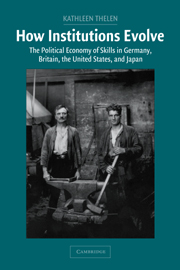 How Institutions Evolve
How Institutions Evolve Published online by Cambridge University Press: 05 September 2012
This chapter summarizes the main empirical findings of the analysis, both the cross-national and the longitudinal dimensions, and relates these findings to several major theoretical debates in the literature. The analysis of cross-national differences in the institutions governing in-plant training and the over-time analysis tracking the evolution of the German system over a longer period speak to debates in the political–economic literature on “varieties of capitalism” concerning institutional origins and institutional complementarities. Moreover, the analysis here provides insights into a broader literature in political science concerning issues of institutional reproduction, institutional change, and path dependence in politics.
Cross-National Comparisons: The Origins of Divergent Skill Regimes
The single variable that mattered most crucially to the divergent trajectories of skill formation documented here was the behavior and strategies of leading firms in skill-intensive industries, particularly the machine and metalworking industries. Around the turn of the century, large machine and metalworking firms across all four countries shared similar interests and were pursuing roughly similar strategies with respect to skill formation. Circa 1895 firms like M.A.N., Mather and Platt, Yokosuka, and General Electric were all engaged in efforts to develop their own in-plant capacities for skill formation and combining these with various policies designed to co-opt workers and exclude unions. From then on, however, trajectories diverged as these firms adapted their strategies to the particular constellation of incentives and constraints they faced in their separate countries.
To save this book to your Kindle, first ensure [email protected] is added to your Approved Personal Document E-mail List under your Personal Document Settings on the Manage Your Content and Devices page of your Amazon account. Then enter the ‘name’ part of your Kindle email address below. Find out more about saving to your Kindle.
Note you can select to save to either the @free.kindle.com or @kindle.com variations. ‘@free.kindle.com’ emails are free but can only be saved to your device when it is connected to wi-fi. ‘@kindle.com’ emails can be delivered even when you are not connected to wi-fi, but note that service fees apply.
Find out more about the Kindle Personal Document Service.
To save content items to your account, please confirm that you agree to abide by our usage policies. If this is the first time you use this feature, you will be asked to authorise Cambridge Core to connect with your account. Find out more about saving content to Dropbox.
To save content items to your account, please confirm that you agree to abide by our usage policies. If this is the first time you use this feature, you will be asked to authorise Cambridge Core to connect with your account. Find out more about saving content to Google Drive.